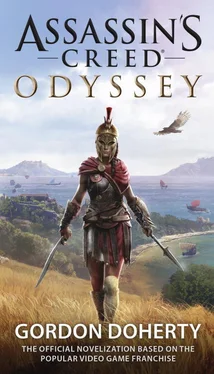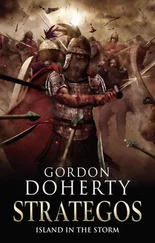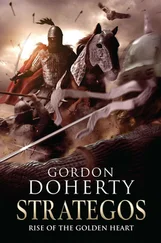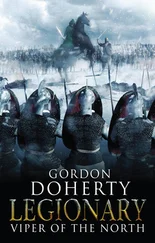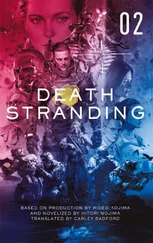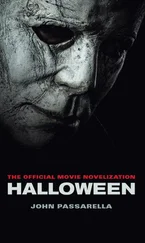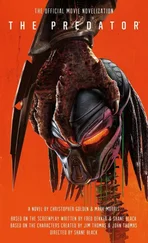My hands clawed the air. I plummeted into blackness, seeing his face vanish, hearing Mother’s soul-tearing final cry. For a few breaths, there was a weightless fall, in time with the sleet, and a roaring wind around my ears, and then it was all over.
And from blackness I awakened. A high-pitched squeaking stirred me first, and then a gentle pecking at my face. I opened my eyes. First, I could see the flickering of the storm high above, the few icy blobs of sleet that made it all the way down here pattering on my face. On the floor of this sheltered abyss, all seemed eerily quiet. Were these the first moments of my eternity as a shade?
Then a tiny bird’s head craned over me. Coated in white down with gray-ringed eyes. A pathetic specimen. I ducked out of the way as it pecked at me again. A dry clunk of something shifting beneath me and a horrendous pain through my shoulders and one leg told me I was no shade. I was alive. Somehow, I was alive. I sat up. The bird waddled clumsily up onto my thigh. A spotted eagle hatchling, I realized. I lifted the mite, cradling it in my palms, weeping, longing to wake from this nightmare. My eyes began to adjust, and I saw the dry “rubble” upon which I lay for what it truly was: a pool of bones. Grinning skulls, smashed and cracked, rib cages hanging from gnarled outcrops, rags of clothing too. With a cold, rampant horror, I realized that almost all of them were the skeletons of infants. The unwanted progenies of Sparta. Too weak or imperfect, the elders had deemed.
“Alexios?” I whimpered, knowing he must be down here too. Even to cradle his body would have meant something. “Alexios?”
Nothing.
I set the eagle hatchling down and rolled onto my knees, keeping the weight from my damaged leg, crawling over the ossuary pit, feeling with my hands where the darkness would not allow me to see. Then I felt it: something soft and still warm. “Alexios?” I wept.
A streak of lightning high above revealed the staring, smashed corpse of the ephor—his face locked in a shriek and the back of his bald pate burst like an egg. I leapt back, horrified, grabbing a bone—as if I would need a cudgel to protect myself from that dead wretch. Yet I lifted up before me not a bone, but the Leonidas half spear.
I stared into the blade, hateful, bereft, lost. I staggered around the pit of bones, searching for Alexios’s body in a daze… until I heard the sound of bones shifting in a rocky corridor nearby, saw a tall shadow. Someone was coming. If they found me here, alive after all that had happened, they would strike me down. And so I took up the eagle chick and ran… from Sparta, from the past and all its horror.
• • •
The Wolf of Sparta braced, hands raised to halt his onrushing daughter. “How can it be?” he gasped.
Kassandra answered with a lightning attack, her lance streaking around for his throat. It was only his Spartan instincts that saved him, yanking a short sword from a bicep belt and blocking her strike with it. He swayed, his heels on the precipice, his eyes darting to the Spartan camp behind Kassandra as the thunder raged above.
“Zeus roars for me,” she growled, “and so none will hear if you cry for help.”
The Wolf’s arms shot out for balance and Ikaros swooped in to steal his blade. He gasped, pitching out into a death drop onto the bay below.
Kassandra reached out to grab him by the throat, the lance tip poised at his side, holding him on twin horns of death. “Now, Wolf ,” she spat, edging him out a little farther, “justice can be done.”
“Kill me, then,” he said with a throaty crackle. “But before you do, there is something you must know. I loved you and your brother as if you were truly my own… but you were never mine.”
The storm raged around her and a tempest rose within too. “What do you mean?” She jerked the spear tip a little, drawing blood on his flank.
“That is something you must ask your mother.”
Kassandra felt her soul freeze. “Mother is… alive?”
Nikolaos nodded as best he could. “She is lost to me and me to her, but she lives. She fled Sparta that very night. To where, I do not know. Find her, Kassandra, and be sure to tell her that I have never forgiven myself for what happened. But with every step you take you must beware,” he rasped, his eyes maddened, “beware the snakes in the grass.” He grabbed her spear hand, pushing the lance tip a little deeper into his own flesh. “Now… end this.”
At the last, lightning shivered across the sky and in his bronze Korinthian helmet she saw her own face reflected. Ice crept across her heart, her throat grip slackening to let him fall, her spear arm tensing to run him through. The key to twenty years of caged injustice lay in her grasp at last.
The port town of Kirrha sweltered in the June heat, the glare of the sea blinding, the pale mountains rising behind it dazzling. The tracks veining those slopes were dotted with pilgrims trekking into the heights to visit Delphi and its famous inhabitant: the Oracle, the Pythia , the keeper of the wisdom of Apollo, the seeress of all Hellas.
Kirrha’s dock was a riot of stenches and garish colors. Not a single patch of harbor water could be seen, thanks to the hundreds of bobbing rafts, skiffs and small private boats crammed there. Sailors scampered around the decks and scurried up the masts of one boat, tied at a private mooring, tying up its hideous, gorgon-head sail. Pilgrims swarmed over gangways and onto the wharfside, jabbering and singing, looking around in wonder. Merchants yapped and bleated, offering their “sacred” statuettes and trinkets to the passersby. Local children leapt from raft to raft, peddling cool drinks to the thirsty visitors. Smoke columns rose and bells clanged constantly as the crowds waded through the packed streets and onto the pilgrim’s path.
Cutting through the swarms from the private mooring, like a boat moving upstream, was a gold-draped litter.
Elpenor was a cruel man—the kind of man who enjoyed watching his friends fail. He weighed the sack of coins resting beside him in his litter. Perhaps he would divert these funds to his growing fishing business. “I could buy three new boats for my fleet,” he purred, “or… I could pay the toothless crooks at the harbor to scuttle twelve of Drakon’s ships.”
Drakon had been his best friend since childhood, and his wife and daughters even called Elpenor “uncle.” In the early days, Drakon’s family were poor—almost beggars—and Elpenor had enjoyed giving the family a few coins from his business earnings. The enjoyment came not from helping them, but from the feeling of control. Without his small donations, they might not eat. It thrilled him at the time. But Drakon had been overly loud about his gradual change of fortunes: finding a seabream-nesting area out at sea, and using his pathetic little skiff to bring in bounteous catches for months on end. On and on Drakon had bleated about his new boat, then his burgeoning fleet and the wealth he had acquired through it, and no longer did he need Elpenor’s charity. “Decision made.” Elpenor grinned with a venomous twitch. “I hope you are a good swimmer, Drakon.”
His nostrils flared in disgust as a waft of onions and unwashed nether regions rose from the bare-chested pilgrims standing outside the tavern, braying crudely at their own gutter humor. Get into the hills, pay your dues and begone, he cursed them all. He clapped his hands once to quicken his carriers. “Move. I want to be in my villa before noon, before the stink becomes intolerable.”
They cut through a maze of tight lanes and at last came to the edge of town, passing through the iron gates of his estate. The litter was set down, and Elpenor rose, hearing the gentle gurgle of the fountain, smelling the sweet chamomile of his gardens. Stepping inside, he slipped off his expensive leather slippers and enjoyed the feel of the cool white-marble floors on the soles of his feet. He heard the two litter slaves shuffling away and turned to one of them, clicking his fingers. “You, pour some sweet oils into the bathing pool”—his gaze grew carnal—“and wait on me in there. You had better please me this time. I don’t want to have to hurt you again.”
Читать дальше
